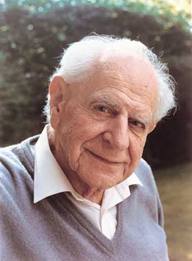 menu w Cafe Aleph
menu w Cafe Aleph
Karl Popper o ewolucji i cudzie emergencji Witold Marciszewski |
|
§1. Do znaczących zdarzeń w filozofii XX wieku trzeba zaliczyć odczyt Karla Poppera wygłoszony 8 listopada 1977 w Darwin College w Cambridge. Popper był w filozofii minionego stulecia istnym fenomenem przez swą niezwykłą kompetencję w matematyce, fizyce, biologii, historii nauki, filozofii, naukach społecznych. A także przez wyjątkową oryginalność idei, siłę słowa i wigor polemiczny. Wśród jego płodnych i wysoce oryginalnyuch idei są poglądy
na emergencję i ewolucję. Oddajmy mu głos, cytując w oryginale fragmenty
wspomnianego odczytu.
"There is, on the first level,
the theory of the emergence of heavy atomic nuclei in the centre of big
stars, and, on a higher level, the evidence for the emergence somewhere in
space of organic molecules.
On the next level, there is the emergence of life. Even if
the origin of life should one day become reproducible in the laboratory,
life creates something that is utterly new in the universe: the peculiar
activity of organisms; especially the often purposeful actions of animals;
and animal problem solving. All organisms are constant problem solvers; even
though they are not conscious of most of the problems they are trying to
solve.
On the next level, the great step is the emergence of
conscious states. With the distinction between conscious states and
unconscious states, again something utterly new and of the greatest
importance enters the universe. It is a new world: the world of conscious
experience.
On the next level, this is followed by the emergence of
the products of the human mind, such as the works of art; and also the works
of science; especially scientific theories.
I think that scientists, however sceptical, are bound to
admit that the universe, or nature, or whatever we may call it, is creative.
For it has produced creative men: it has produced Shakespeare and
Michelangelo and Mozart, and thus indirectly their works. It has produced
Darwin, and so created the theory of natural selection. Natural selection
has destroyed the proof for the miraculous specific intervention of the
Creator. But it has left us with the marvel of the creativeness of the
universe, of life, and of the human mind. Although science has nothing to
say about a personal Creator, the fact of the emergence of novelty, and of
creativity, can hardly be denied. I think that Darwin himself, who could not
"keep out of the question", would have agreed that, though natural selection
was an idea which opened up a new world for science, it did not remove, from
the picture of the universe that science paints, the marvel of creativity;
nor did it remove the marvel of freedom: the freedom to create; and the
freedom of choosing our own ends and our own purposes." |
